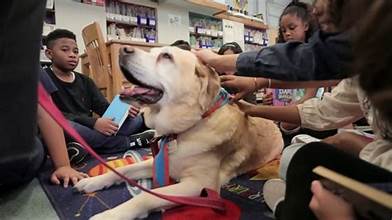Can My Child Bring Their Therapy Dog to School or Public Spaces?
Can your child bring their therapy or service dog to school or other public places? Learn the differences between service animals and emotional support animals, and what rights your child has under ADA law.
🐾 Introduction: The Power of Support Animals for Children with Special Needs
For many children with disabilities, a support animal is more than just a pet—it’s a lifeline. Whether it’s calming anxiety during a meltdown, guiding a child with autism safely across a parking lot, or providing a comforting presence during sensory overload, service, and therapy dogs make a real difference.

But parents often ask: “Can my child bring their support animal to school?” or “Are therapy animals allowed in public spaces?” The answer depends on the type of animal, the child’s needs, and the setting.
Let’s explore the laws and rights you should know as a parent or caregiver.
🐶 What Type of Animal Does Your Child Have?
Before diving into school policies or public access, it’s essential to understand the three main types of support animals:
✅ 1. Service Dogs (Protected by the ADA)
These dogs are individually trained to perform specific tasks for individuals with disabilities, such as alerting to seizures or guiding the visually impaired.
- Allowed in schools, restaurants, stores, and public spaces
- Legally recognized under the Americans with Disabilities Act (ADA)
✅ 2. Emotional Support Animals (ESAs)
Provide comfort and emotional support through their presence, but refrain from performing specific tasks.
- Not protected under the ADA for public access
- Often recognized under housing laws or limited school policies.
✅ 3. Therapy Dogs
Trained to provide comfort in group settings such as hospitals, libraries, or classrooms, but they are not considered service animals under federal law.
- Allowed only by permission of a school or institution
🏫 Can a Child Bring Their Dog to School?
✅ If it’s a Service Dog: YES
Under ADA law, schools must allow a trained service dog to accompany a child with a disability, provided the dog:
- Is trained to perform tasks related to the child’s disability
- Is housebroken
- It is always under control.
👉 The ADA covers public and charter schools.
👉 Private schools may vary depending on funding and state law.
Tip: For students with IEPs or 504 Plans, you can request a meeting to have the service dog formally included as part of their support system.
⚠️ If it’s an ESA or Therapy Dog: MAYBE
Schools are not legally required to allow emotional support or therapy animals, but some may choose to on a case-by-case basis. Decisions often depend on:
- School district policy
- Allergy concerns of other students
- Behavior and training of the animal
📝 Parents should:
- Submit a formal request in writing
- Provide documentation from a medical or mental health professional.
- Offer a behavior and vaccination report for the animal.
🚪 Can My Child Bring Their Dog to Other Public Spaces?
Here’s what you need to know about the setting:
✅ Public Places (stores, parks, libraries):
- Service dogs only have full access under federal law.
- ESAs or therapy dogs may be allowed by permission.

🏥 Hospitals or Medical Clinics:
- Must allow service dogs
- May allow therapy dogs if pre-approved and certified
✈️ Airports and Planes:
- Service dogs are permitted
- ESAs are no longer allowed in airline cabins as of 2021
👩⚖️ What Schools Can Legally Ask
Schools and staff cannot ask about your child’s disability, but they can ask:
- Is the dog a service animal required because of a disability?
- What work or task has the dog been trained to perform?
They cannot demand:
- Medical documentation
- A service dog ID or certificate
- A demonstration of the dog’s task
🧩 Advocacy Tips for Parents
- Prepare early: Include the service dog in your child’s IEP or 504 Plan
- Document everything: Keep vet records, task training evidence, and letters from professionals
- Stay calm and educate: Many schools and businesses are simply unaware of the law.
- Know your state’s laws: Some states expand ADA rights to cover ESAs in schools.
🔑 Final Thoughts
Your child’s support animal could be the key to emotional stability, independence, and comfort. Understanding the laws around service dogs, therapy dogs, and ESAs is crucial. It not only helps you advocate with confidence and clarity but also empowers you with the knowledge to ensure your child’s rights are protected. As a parent or caregiver, your role in advocating for your child’s rights is crucial. While schools may have limits on ESAs and therapy dogs, a trained service dog has legal protections, and with preparation and patience, you can help your child succeed with their companion by their side.




